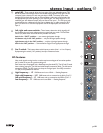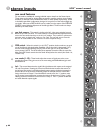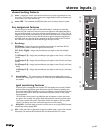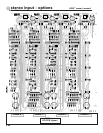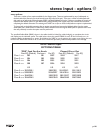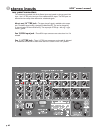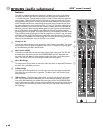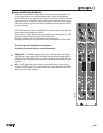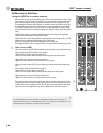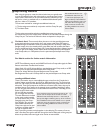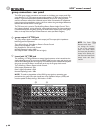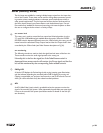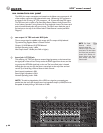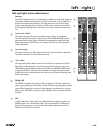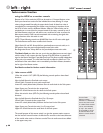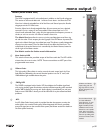
p. 30
HPW
TM
owner’s manual
groups
6
fader-reverse function
using the HPW as a monitor console
Because of its 10 Aux sends, the HPW can be used as a 10-output Monitor mixer. Each
input channel can access all of the individual Aux mixes, allowing 10 unique mixes to be
generated. Normally, the output level of each of these Aux mixes is controlled by the
corresponding Aux Master rotary level pot. In situations where the HPW is to be used
as a dedicated Monitor Mixer, the 100mm faders can be switched-over to control the
Aux outputs instead of the rotary controls by use of the Fader-Reverse switch. Other
controls, associated with monitoring the signals, also change functions when this switch is
used.
NOTE: These following controls are ALWAYS fed from the Group audio signal, the
Fader-Reverse switch does not affect their function.
Matrix Sends M1 and M2: Always fed from post-level/post-mute Group audio, or in PRE
position, from the post-insert/pre-level/pre-mute Group audio.
Group Pan: Always fed from the post-level/post-mute Group audio.
Bus Assignment Mono and L-R: Always fed from the post-level/post-mute Group audio.
fader reverse w/LED
When this switch is up (LED Off), the following controls perform these listed functions:
Mute (w/Led): Mutes the Post-fader Group output
100mm Fader: Controls the Group output level
Lower AFL switch (below fader): Monitors the Group level via the Solo system
Upper Rotary pot:: Controls the Aux output level
Upper AFL switch: Monitors the Aux level via the Solo system
When this switch is down (LED On), the following controls perform these listed func-
tions:
Mute (w/Led): Mutes the Post-fader Aux output
100mm Fader: Controls the Aux output level
Lower AFL switch (below fader): Monitors the Aux level via the Solo system
Upper Rotary pot:: Controls the Group output level
Upper AFL switch: Monitors the Group level via the Solo system
The overall purpose of this reverse switch is to give the operator easier access to the
Aux level and control functions. It shifts the Aux controls to the lower, fader-area of the
module when used as a Monitor console. The Group controls are shifted to the upper-
rotary area, since the assignable Groups are not often used in a Monitor console.
Use the Fader-Reverse switches whenever it is beneficial to have an Aux level control on
a fader. These switches can be used individually (if only 1 Aux needs to be controlled), or all can
be switched when a full Monitor Console function is desired.
®
45
45



